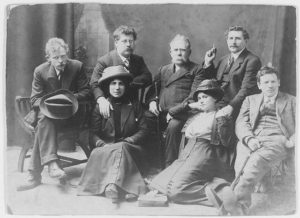 It wasn’t very hard to see, as the 1970s passed into the ‘80s and ‘90s, that adults were abandoning their roles in the world. They resigned, en masse, and were replaced with youth-friendly types. Youth culture had become a great sales tool, after all, due largely to overly-indulgent parents.
It wasn’t very hard to see, as the 1970s passed into the ‘80s and ‘90s, that adults were abandoning their roles in the world. They resigned, en masse, and were replaced with youth-friendly types. Youth culture had become a great sales tool, after all, due largely to overly-indulgent parents.
By now, the cultures of the West have been very widely “youth-enized.” (Pun unintended but sadly applicable.) As just a small example, you can hardly find a museum these days that hasn’t sold out to bright colors and dumbed-down exhibits.
It’s not the young who are culpable for this, of course: youth is a necessary stage that we all go through. It’s the adults who are at fault, for abdicating their natural roles.
Adulthood is a much longer stage than youth, and a far more important one… one that ought not be abandoned: A world depleted of adults and adult characteristics is a world geared for foolishness.
The Results
Before jumping into the good news, I should specify a bit on what has happened over the past fifty years, as adulthood has been progressively abandoned. I’ll be brief:
-
- By evading adulthood, a large percentage of the populace has also learned to evade responsibility, since responsibility was seen as an adult thing. The truth, of course, is that responsibility isn’t an adult thing, it’s a heroic thing. That point, however, has seldom been made… and almost never on the largest platforms.
-
- Because responsibility has become so terrifying to so many people, the application of guilt has become inordinately powerful.
-
- Socialism has reigned. (See Marx’s initial wish list and compare it to modern governance; Marxists have already gotten almost everything they wanted.) This occurred largely because so few proud adults were seen or heard. Socialist major on complaining, and complaints resonate with young people. More importantly, the young are inexperienced with causes and effects, and so it’s easy for them to accept the magical solutions of the socialists.
-
- The height of enjoyment has become the life of a beer commercial or music video, championing little or nothing north of the belly. This forges meaningless lives, devoid of enduring satisfactions. And so meaning has been pushed out of the larger culture. That is a gaping void.
-
- The talented young person who tries to “adult-up” risks becoming “other” to many of his or her contemporaries.
-
- The abandonment of adulthood has led to poor parenting.
-
- Thinking, for most people, most of the time, has become skin deep. Five-second sound bites, 400-word “thought pieces,” trite little slogans that will decide who will control other people’s lives, and 140-character mind food… it’s all surface stuff. As Ray Bradbury noted, “We bombard people with sensation. That substitutes for thinking.” Humans need to understand deeply, in concepts. If they do not, things begin to rot. Deep thinking requires time and focus, and the world of social media, TV news and politics is structured to prevent precisely that.
-
- The culture has become deeply permeated with fear. There are many reasons for this, but the maintenance of adulthood would have restrained it, and perhaps prevented it.
The world needs grown-ups. Without them, we get slaves and masters.
Adulthood Is Returning
As it happens, the mainline culture is burning itself down just as a new generation (Gen. Z) is leaving it. By nearly all accounts these young people are more adult-minded than those who raised them. Perhaps it’s because they’ve seen where it led, or perhaps it’s something else, but they are not the same as their parents.
To put the situation into rough terms, the cultural arbiters of the West have forced each succeeding generation into the model of the Baby Boomers. Selling to children is a lot easier than selling to adults, after all.
It was not always so. The Enlightenment, among other episodes, featured people who were tired of living as children and who sought adulthood. Immanuel Kant, in What Is Enlightenment?, described it this way:
Enlightenment is man’s emergence from his self-imposed childhood.
“Man,” as Rabbi Heschel used to say, “is not always blind.” And so it seems that the young generation is wearying of perpetual childhood, imposed upon them by perpetual children.
Let’s all support them as best we can.
**
Paul Rosenberg
freemansperspective.com
